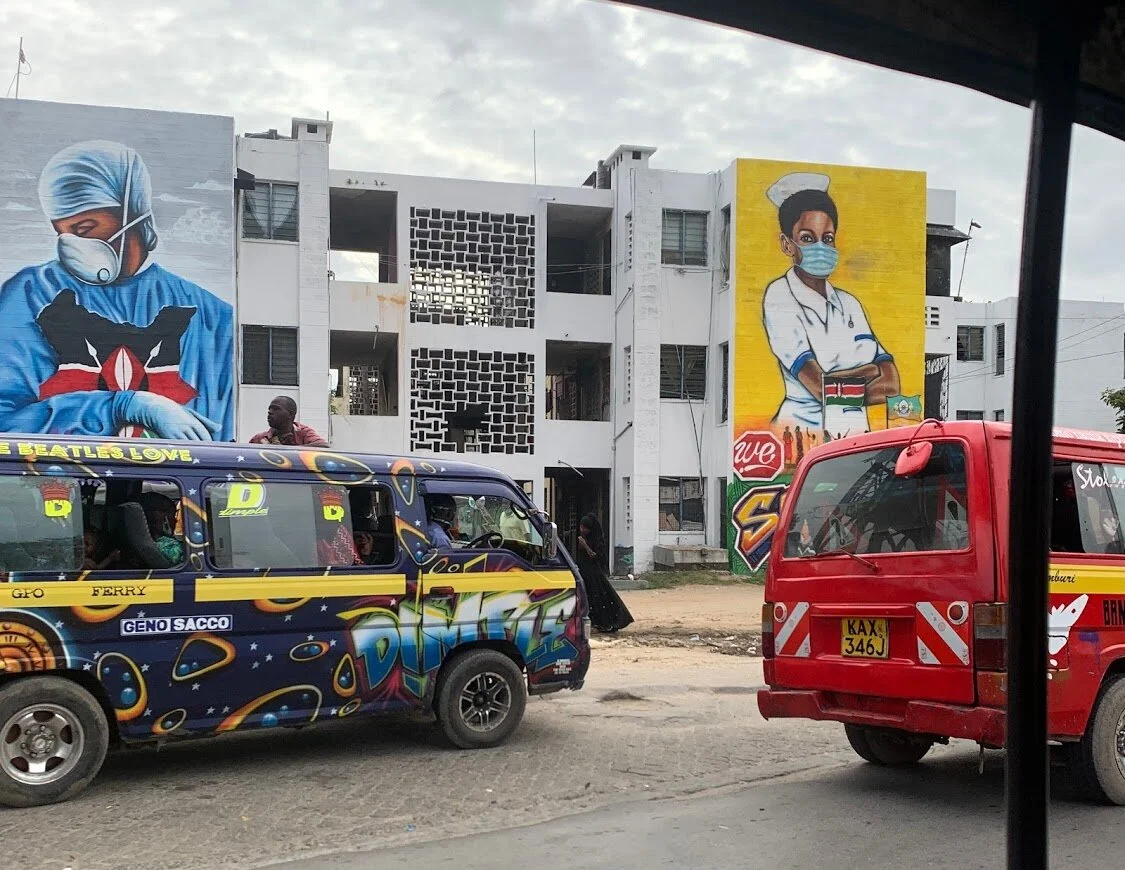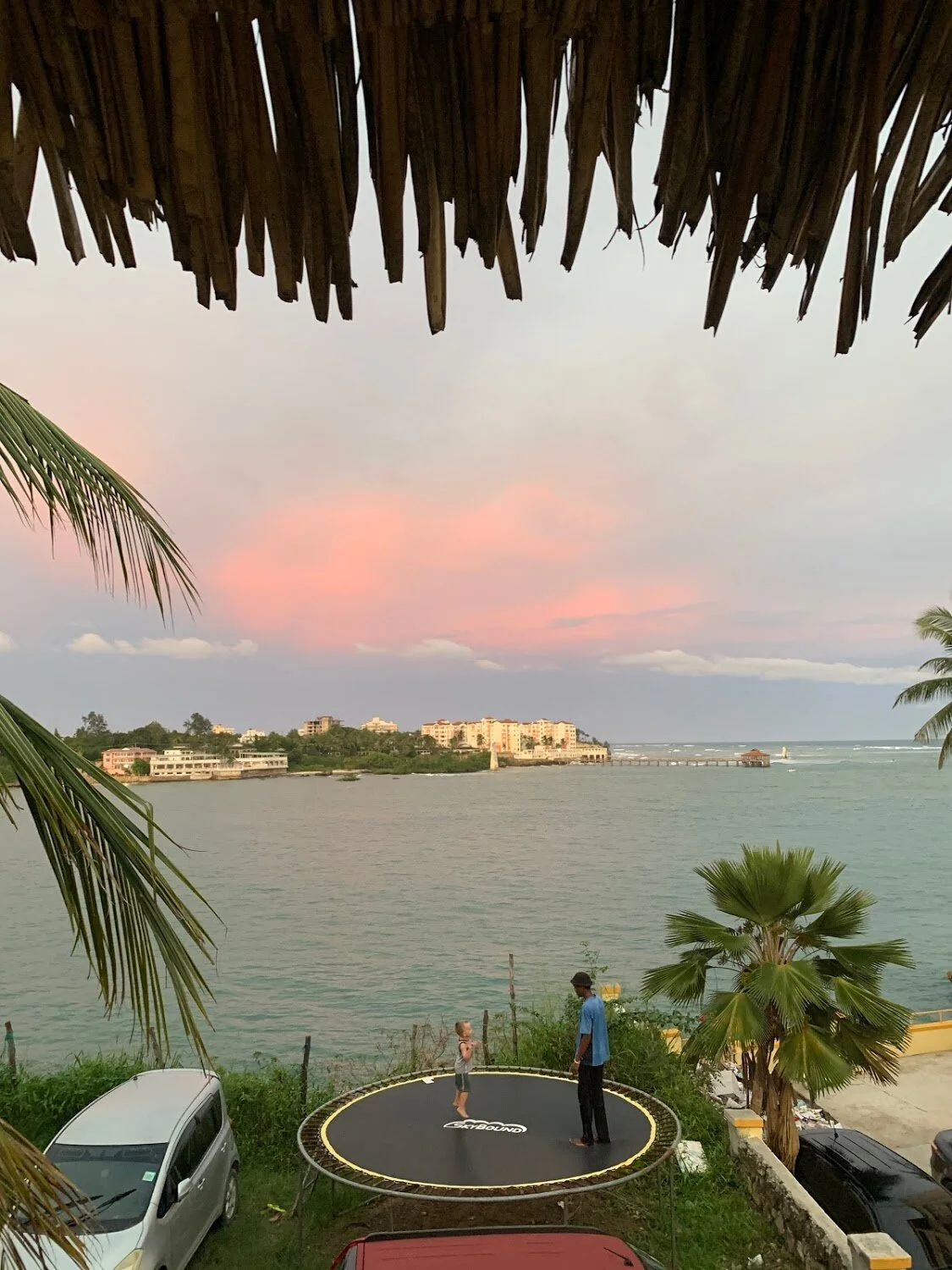Carly | Stories from lockdown in Mombasa, Kenya
“I was thankful to be living in a community-oriented place that found really creative ways to come alongside each other. ”
Carly and I met in our Honors program at DePaul University, both ended up with Jeep Renegades in Denver for a few years—and spent some lovely time catching up this week. She called us ‘kindred spirits’ and I think that’s about right, never in the exact same circles, but always in touch and going through similar things. It was so interesting to hear about her year in Mombasa Kenya, which was largely marked by the pandemic. She does a wonderful job of explaining the historical reasons for so much of what she experienced in Kenya’s handling of the pandemic and I learned so much—both about Carly and about this amazing country. Please, take some time to listen to this story, learn how our neighbors on the other side of the globe have experienced this time and community, and to explore some of the resources provided at the end. Recorded November 20th…
The first time I had heard about Covid 19 was just kind of on the news. I had, in October of last year, I had just moved to Mombasa Kenya for the very first time [...] I was still adjusting to new things [...] and I very distinctly remember hearing about Covid about when I arrived.
“In Kenya there had been a lot of business dealings and political interactions with the Chinese government, so I remember a lot of people all over the news talking about this coronavirus that was arriving in these provinces in China. It was never really anything that I understood of coming to Kenya.
It was in March when all of the official lockdowns happened. And it all happened rather quickly. Only a few months I really had to appreciate or experience Kenya as it was pre-Covid.
”
“I just got back this October, so I was there a year. But the majority of the time in Kenya was a Covid-Kenya. So I think it is also a different experience of everything I experienced there was kind of in light of Covid, besides those original three months.
”
“I noticed that Kenya followed suit of a lot of other East-African countries. So, we were a little bit delayed behind the United States and Europe, so I was watching it happen from afar. But eventually what took place was: we had international travel bans [...] shutting down borders between bordering countries. I was in Mombasa on the coast, so there were two counties in Kenya that was completely locked down within themselves and that was Mombasa and Nirobi. And then other regions of Kenya at different points. So, Mombasa is an island [...] we were kind of stuck within our counties. There were also curfews, so we weren’t allowed to leave the house after 7pm, we had mask restrictions. So in theory—there’s a lot of nuances here—the government out mask mandates in place where if you weren’t wearing your mask you either had to pay $200—20,000 shillings—or you could be sent to prison.”
“People who were found infected with Covid were sent to these government hospitals or shelters where they’d isolate people. ”
“The way that information is disseminated in Kenya is also very confusing. So I think at first there was a little bit of fear. But what happens is everything is sent around on a WhatsApp group. You won’t know there’s a formal announcement or anything until there’s a WhatsApp message from someone.
There was also a lot of sadness tied up in those regulations. That was my perception and the perception of the other ex-pat’s that I was there with. In terms of the locals, I think it was very similar, the local Kenyans that I know are so strong and they are aware of what’s happening with their government [...] at first it started with fear. But once they didn’t really see anyone getting sick, and the testing—there’s a whole bunch to unpack about how that process unfolded—but they almost then, things eased over time.
”
“The trickiest thing when you’re talking about how “Africa is doing really really well,” is here in the West for the most part, you can trust the numbers you’re getting. In Kenya, I would say one of the biggest issues is it really depends on the testing methods. So, there was a huge fear at the beginning that because of the state of a lot of the development in Africa, that quarantining would be difficult. They thought it would just over-run everything. So the fact that it hasn’t I think is a good sign [...] In fact, by the time I left I had barely known someone who had known someone who had tested positive for COVID on the coast.
”
“What they were doing was, they were essentially testing people—force testing people—and then if they “tested positive” no guarantee what was a positive test and what wasn’t [...] they would send them to these government facilities that were horrible conditions, where they were quarantined with other people who may or may not have tested positive. So you are really actually cross-contaminating a lot of people. And then you are forcing those people to pay [...] to be force quarantined and you have no choice and you have to stay two weeks. And when you are dealing with marginalized populations who can’t afford that, what that makes people is really fearful.
People were fearful of being tested [...] twenty days worth of employment for one night in a COVID facility. So it is hard to say the numbers are accurate because there was a lot of avoidance of testing.
”
“Kenyans have really strong immune systems, they’re just really strong. When I first got to Kenya I got dengue fever. And I remember I was just—out. It was probably one of the worst things I’ve ever experienced. But these tropical diseases, right? Dengue fever, malaria—Kenyans deal with these things everyday. It’s just a very common reality. So we also joked [...] even if people had COVID a lot of them may have just chalked it up to different tropical illnesses and never really known that’s what it was.
”
“I worked for an artisan social enterprise. So our role was to help artisans in Coastal Kenya provide them with dignified employment [...] Literacy classes, child care, tuition reimbursement, things like that. So my job was really just working in the office and helping community development, and kind of keep the programs up and running [...] our work was impacted rather significantly. Our biggest concern working with marginalized populations was health, and then financially [...] they have to work. People in kenya work hand-to-mouth, which means the dollar they earn that day is the dollar they feed their family with that evening.
When we shut down, we weren’t making money and our artisans weren’t able to work.
It was a race for our team to figure out ‘what can we do.’
Yes the risk of COVID, but the balance...if I don’t work I don’t eat. We were able to secure some funding to provide care packages, sanitary packages, and food items to help weather that storm, but it’s still very much going on right now.
”
“It’s hard to say what would have been if it hadn’t been the pandemic. Coastal Kenya is breathtaking, so I would say first and foremost—I was really sad because if there had been no pandemic, Mombasa is right on the Indian Ocean and has some of those most beautiful beaches [...] and I couldn’t just freely experience Mombasa in the way I would have liked to. But you do what you can.
I was able to work and fulfill my job function while I was there. So I spent a lot of time by myself [...] it was sad to be like ‘I am in this beautiful place, I spent my whole life dreaming of coming here and living here and I can’t take advantage of it.’
Once in a while I would have some girls over to my home, which was really nice [...] felt like I was in high school again in a lot of ways, we just had a lot of sleep overs and watched movies, and very normal stuff [...] I mourn a little bit the relationships that were being built.
”
“What has been interesting about the pandemic in the U.S. is the divisiveness about it. In Kenya there was just a lot of uncertainty, but it was more about survival [...] It forced people to come together because they have no other option. Here [Minnesota] I have just been living a little bit in fear of like, saying the wrong thing or being sensitive to people’s needs [...] Coming back here and seeing that people are really hurting from it.
I’ve just had this crazy experience that I’ve came through cross-culturally and trying to address the need in my heart to not want to elevate that experience, and realizing if I had come back and the pandemic hadn’t happened I think people would—like finding that I need care and support I think right now, I am not good at asking for that. And I am afraid to ask for that because I also know the burden that a lot of other people have been carrying this year. So it’s been a unique combination.
”
For more information on the work Carly was a part of in Kenya please check out @imanicollective on instagram or visit: https://imanicollective.com/
To learn more about COVID and its impacts in Kenya and other East African countries, Carly recommends these articles:
https://twitter.com/AmnestyKenya/status/1243808338191814656/photo/1
https://www.nytimes.com/2020/05/08/world/africa/kenya-coronavirus-quarantine.html











